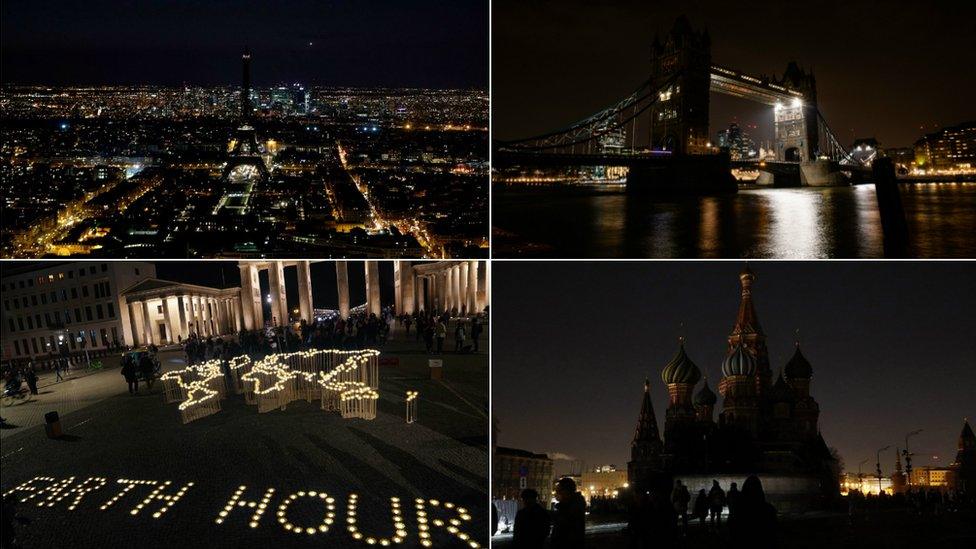Earth Hour 2019: World's landmarks go dark for Earth Hour
- Published
- comments

Can you recognise these famous buildings when they're not lit up?
Famous landmarks around the world have been switching off their lights for Earth Hour, which happened at 8.30pm on 30 March 2019.
The event takes place every year, encouraging people to turn off their lights for 60 minutes to raise awareness of environmental issues.
Buckingham Palace, Edinburgh Castle, the Sydney Opera House, Empire State Building, the Eiffel Tower, and many other famous landmarks were plunged into darkness.
It famously started as a lights out event in Sydney, Australia in 2007. Since then, it has grown to engage millions of supporters in more than 185 countries and territories.
It's the biggest global switch off of its kind, and last year more than 10 million people across the UK took part.
The Acropolis in Athens turned these lights off for Earth Hour
The second-to-last and last weekends of March are around the time of the Spring and Autumn equinoxes in the northern and southern hemispheres.
That means the sunset times in both hemispheres give the greatest visual impact for a global 'lights out' event.
This Earth Hour, WWF is encouraging everyone to take personal action and is asking people to pledge their #VoiceForThePlanet.
The group say small actions such as saying no to single use plastic can have a huge impact when they're undertaken by millions of people.
This is the Victoria Harbour in Hong Kong seen after its lights went out for Earth Hour
Earth Hour is vital. It gives a powerful voice to millions of people... there are ways that everyone can get involved and make a difference.
How does Earth Hour help?
Earth Hour aims to create a global movement of people and organisations who come together to celebrate the planet and promise to protect it.
Previous Earth Hours have already helped to influence climate policy in Russia, Argentina, Ecuador and Wales.
It has also successfully pushed for planet-friendly laws, such as a ban on plastic in the Galapagos Islands - a group of islands in the Pacific off the coast of South America.
In the city of Cali in Columbia, people made this sign from candles. The 'plus' sign on the Earth Hour logo symbolises that the campaign is beyond just 60 minutes
The event has inspired the world's first Earth Hour protected forest in Uganda.
90% of people who take part in Earth Hour say it inspires them to do more to protect the planet.
Did you take part in Earth Hour? Let us know in the comments below.
- Published7 March 2019
- Published24 April 2019
- Published8 October 2018
